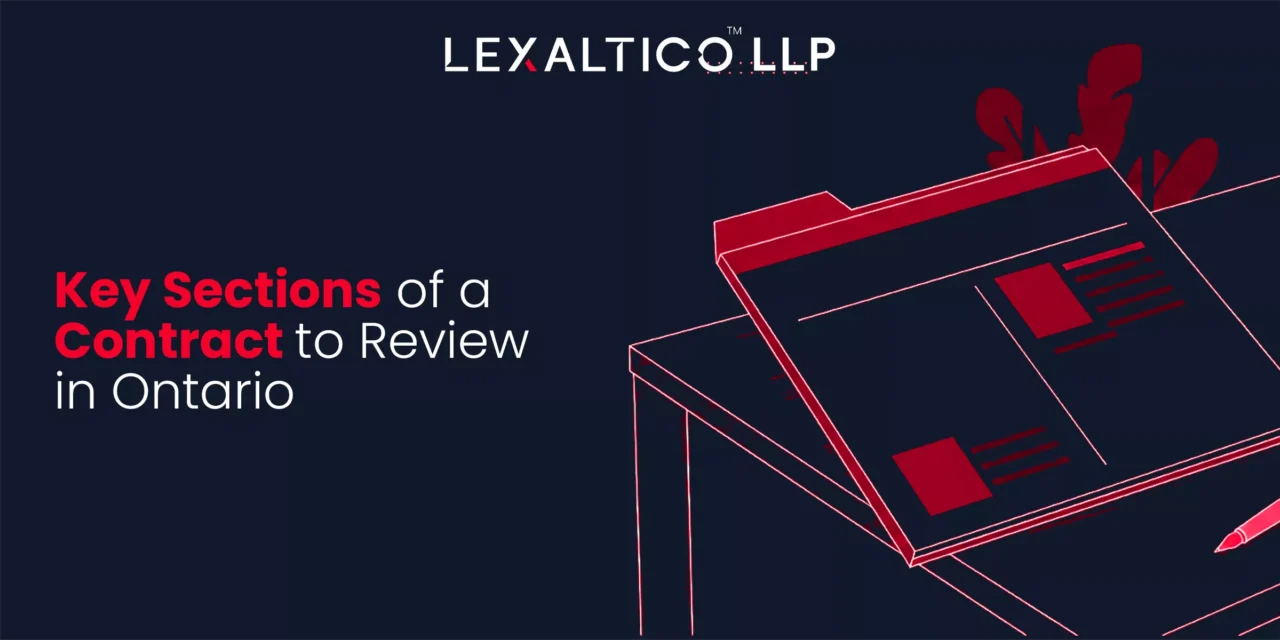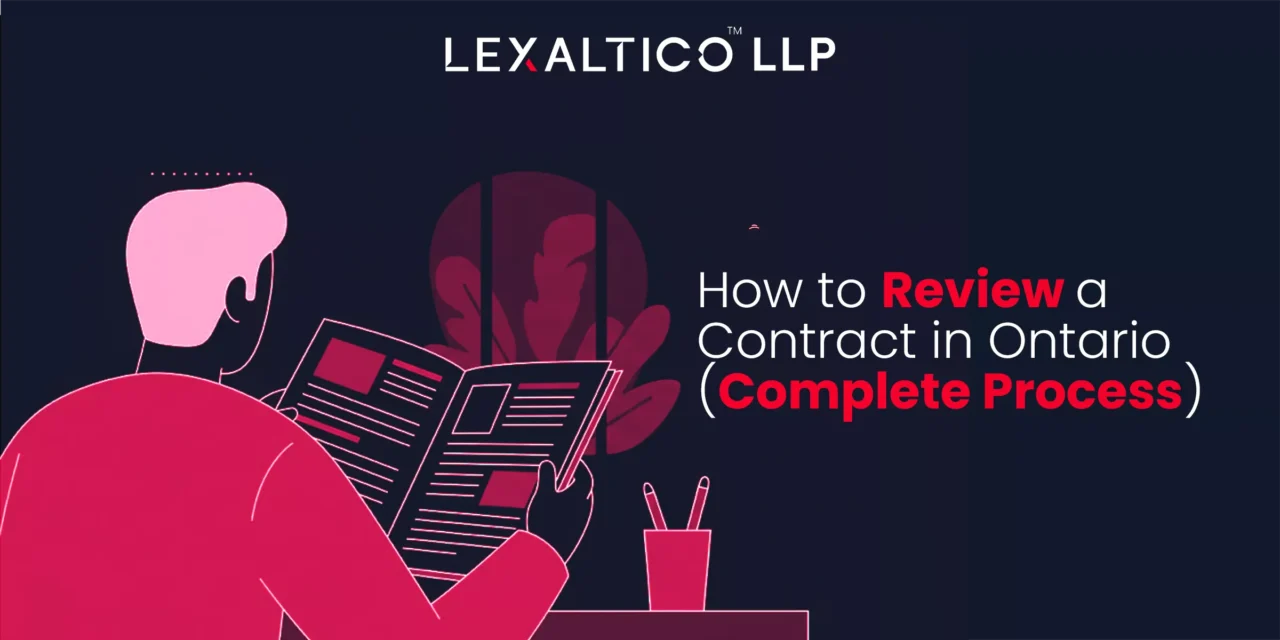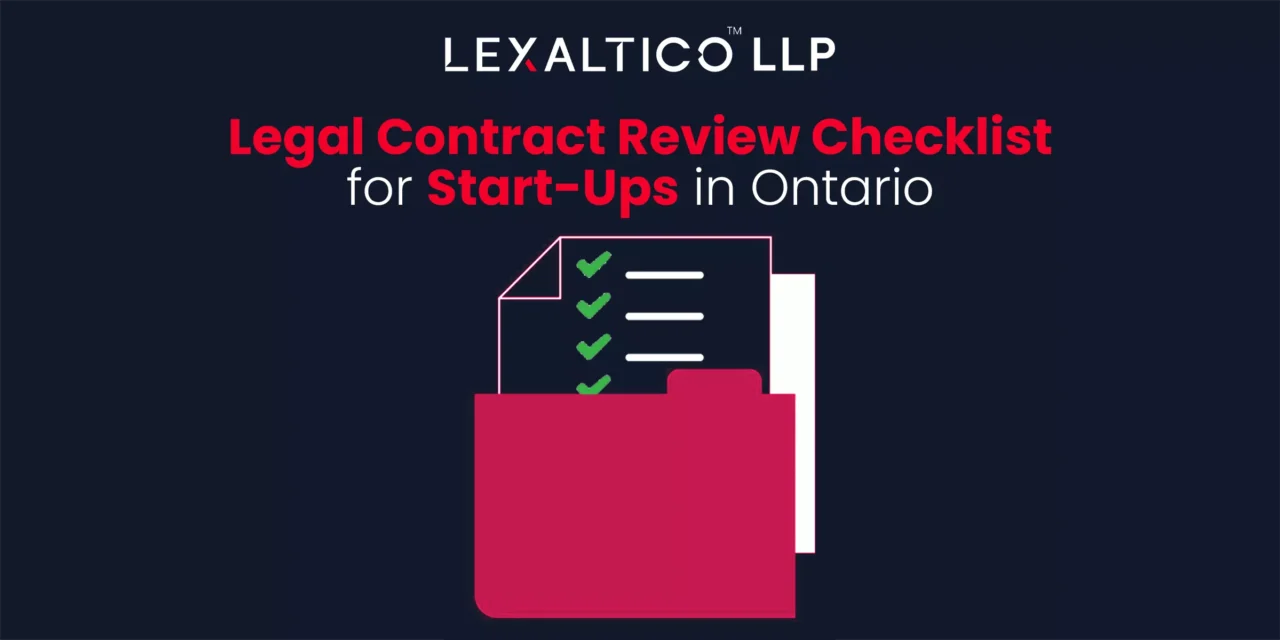Starting a business in Ontario? A contract review checklist can make things much easier. Before you sign vendor agreements, service contracts, or licence deals, you must know what you’re committing to. For start-ups, one overlooked clause can cost thousands. This guide walks you through everything you need, tailored for Ontario start-ups.
We have covered key terms like parties, scope of work/deliverables, payment terms, term and termination, limitation of liability and indemnity, intellectual property rights, confidentiality, non-compete and non-solicitation, dispute resolution/governing law, and boilerplate clauses. We will then walk you through some actionable steps that you can take.
Why Ontario start-ups need a contract review checklist early
For a start-up in Ontario, contracts are much more than paperwork. They define your risks, your rights and your growth capacity. Doing a proper contract review means you won’t be surprised by auto-renewals, hidden liability or unclear deliverables later.
Here are some real-world factors:
- Start-ups often sign vendor or SaaS agreements when cash is tight. A sloppy payment term or auto-renewal clause can bind you for years.
- Local laws matter: in Ontario, governing law, default rights, consumer protection (if applicable), and corporate structure all interplay.
- You need things like IP assignment, founder/shareholder alignment, contract lifecycle management; early mis-steps can hamper funding or exits.
By building and using your checklist now, you strengthen your business foundation.
How to Use contract review checklist for Ontario
Here’s how you can make the most of this checklist:
- Print or keep a digital copy of this checklist beside every agreement you sign.
- At first draft, walk through each bullet below, mark issues or missing items.
- Before signing, review with your legal advisor (Ontario-based if possible) or someone familiar with Ontario commercial law.
- After signature, track key dates (renewal, deliverables, exit rights) as part of your contract lifecycle management.
- For each contract type (vendor/supplier, service contract, licensing agreement, SaaS, commercial lease) adapt the checklist. some clauses matter more than others.
Key Sections of the Contract Review Checklist

Here are the major headings you should run through when doing contract review in Ontario:
1. Parties to the Agreement
- Confirm legal names of all parties: corporation names, jurisdictions, addresses.
- Check if they are signing as individuals, companies or partnerships.
- Verify signatories’ authority to bind the entity.
- If vendor/supplier is outside Ontario, note cross-jurisdiction issues (governing law, enforce ability).
Pro tip: Google the entity names, check Ontario business registry to validate registration.
2. Scope of Work / Deliverables
- Define clearly what is being delivered, when and how.
- Specify exclusions (what you are not buying/leasing/receiving).
- Include timelines, milestones where appropriate.
- For services, include service levels (response times, quality standards).
- If it’s a vendor agreement or SaaS, check what happens if deliverables change.
3. Payment Terms
- Identify payment amount, currency (CAD), schedule, payment method.
- Are any up-front deposits required? Are late-payment fees clearly set?
- Look for auto-price increases, inflation clauses, “meet-the-market” clauses.
- Who bears extra costs (tax, freight, customs, installation)?
- For Ontario: confirm applicable taxes (HST) and locality.
4. Term and Termination Clause
- Confirm the effective date, duration, renewal mechanism (auto or opt-in).
- Check termination rights: for convenience, for cause, for insolvency.
- What are notice periods? Are there termination fees or “lock-in” periods?
- For start-ups: ensure you can exit or renegotiate if business pivots.
5. Limitation of Liability and Indemnity
- Review clauses that limit liability (caps) or shift it (indemnity).
- Are indemnities mutual or one-sided?
- For start-ups in Ontario: watch out for large liability exposure that the start-up cannot afford.
- Confirm insurance obligations (vendor or you) if required.
6. Intellectual Property Rights
- Who owns IP created under the agreement (work for hire, assignment)?
- If licensing technology, what are usage rights, exclusivity, sublicensing?
- For start-ups: ensure founders assign IP to the company; that your product’s IP is clear.
7. Confidentiality Clause / Non-Disclosure
- When sensitive info is shared (e.g., before investment, during development), confidentiality is key.
- Check duration of obligation, permitted disclosures, exceptions (e.g., legal requirement).
- In Ontario, also consider privacy laws (PIPEDA, provincial) if you handle personal data.
8. Non-Compete and Non-Solicitation
- Are there restrictions on the founder/vendor competing or soliciting clients/employees?
- Non-compete clauses should be reasonable (geographically, time-bounded), especially under Ontario law.
- Non-solicitation tends to be more enforceable; check if you’re committing too much too soon.
9. Dispute Resolution / Governing Law
- Identify governing law and jurisdiction (should prefer Ontario if possible).
- Check dispute resolution: mediation, arbitration, court litigation.
- For cross-border agreements: understand how Ontario law may apply or if foreign law governs.
10. Boilerplate Clauses
- Assignment: can parties transfer rights/obligations?
- Variation: how can the contract be amended (written, signed)?
- Force majeure: events (pandemic, natural disasters) relieving obligations.
- Notices: how must they be delivered (email, registered mail) and to whom.
- Entire agreement, severability, waiver.
- Ensure consistency across references (defined terms are used properly).
Additional Checklist Items Specific to Ontario Start-Ups
Since you’re a start-up in Ontario, here are extra check-points for you:
- Incorporation / founder structure: Your contract review should align with your corporate structure. For example, if you are incorporated in Ontario, ensure the contract doesn’t accidentally tie you personally.
- Review shareholder/founder agreements: Sometimes contracts engage with founders personally; ensure they don’t conflict with your shareholder agreement.
- Commercial lease or workspace contract: If you lease space in Ontario, check local zoning, landlord consent, sub-letting rights, termination options.
- Technology & SaaS agreements: Many start-ups consume SaaS. Look for data ownership, privacy/security obligations, exit data return.
- Supplier/vendor agreements: As you scale, vendor contracts matter. Include performance standards, deliverables, termination for poor service.
- Contract lifecycle management for start-ups: As your number of contracts grows, track key dates (renewals, deliverables, obligations) via spreadsheet or tool.
- Red-flags specific to early stage:
- Too long a term with auto-renewal without exit option
- Unlimited liability in a high risk contract
- IP not assigned back to you
- Confidentiality limited only during term but not after
- Governing law outside Canada without clear reason
Step-by-Step Contract Review Process for Ontario Start-Ups

Use this process each time you review a contract:
- Initial Read-through: Read the whole contract to get the big picture. Look for unusual or surprising clauses.
- Detailed Clause Check: Use the checklist above and annotate issues.
- Commercial Check: Does the document reflect what your start-up agreed (scope, payment, timing)?
- Legal Risk Assessment: Use Ontario law lens, dispute resolution, liability, IP, governing law.
- Negotiation: Identify items you must change; list your “must-haves” vs “nice-to-haves”.
- Final Sign-Off: Once changes done, have legal review again, then execute with proper signatures.
- Post-Signature Track: Add key dates (renewal, termination rights, deliverables) into your contract tracker. Alert your team ahead of any renewal/exit window.
Sample Contract Review Checklist Table
| Item | What to check | Why it matters |
|---|---|---|
| Parties | Legal names, addresses, entity type in Ontario | Ensures enforceability |
| Scope/Deliverables | What you get, when, how | Avoids misunderstandings |
| Payment Terms | Amounts, schedule, currency, taxes | Protects cash flow |
| Term/Termination | Start date, duration, renewals, exit rights | Prevents lock-in risk |
| Liability/Indemnity | Caps, mutual indemnity, insurance | Limits risk exposure |
| IP Rights | Ownership, licensing, assignment | Protects your innovation |
| Confidentiality | Term, exclusions, obligations | Safeguards your secrets |
| Non-Compete/Solicitation | Time, geography, parties | Avoids unfair restrictions |
| Governing Law / Dispute | Ontario law? Arbitration? | Sets dispute path |
| Boilerplate | Assignment, variation, force majeure, notices | Ensures contract works smoothly |
Use this table for every contract to keep things consistent.
Pro Tips for Ontario Start-Ups (to go beyond the checklist)
- Keep a contract tracker: spreadsheet with contract name, effective date, renewal, termination date, key deliverables, signatory.
- When negotiating, establish a “take-out” clause: ability to exit if your business model changes significantly.
- For SaaS: ask for data exit rights, ability to get your data back if you leave service.
- Build, over time, standard contract templates for your start-up (vendor, service, licence). That speeds up legal review.
- Consider using electronic signature (valid in Ontario) to speed up execution.
- Before signing long term deals, run a risk-scenario: “What if we pivot in 6 months?” Does the contract let us?
- For funding or investors: ensure founder obligations under contracts don’t conflict with shareholder/founder agreements.
Want help tailored to your start-up’s situation? Contact our legal support team to run your next contract through this checklist and flag any start-up-specific issues. Secure your agreement, and your future.
Frequently Asked Questions
You should check the basics first: who the parties are, what you’re getting, what you’re paying, and how long the agreement lasts. Then look deeper at liability limits, IP ownership, confidentiality, dispute rules and renewal terms. Make sure the contract matches what you actually agreed. Many issues come from vague deliverables or unclear responsibilities, so clarity is key.
A lawyer is not legally required, but it’s highly recommended. Start-ups face tighter budgets and higher risks, and one clause can create a long-term problem. A lawyer can catch hidden liability, unfair renewal terms or IP issues you may miss. For high-value, long-term or technical contracts, a legal review is often essential.
Review contracts at least once a year. Also review after key events like raising funds, changing your business model or adding new services. Many problems happen because contracts auto-renew without anyone noticing. Mark renewal dates and notice periods in your contract tracker.
Tech start-ups must focus on IP rights, data ownership, confidentiality, data handling rules, licensing terms and service-level commitments. For SaaS or software licensing, ensure you own your code, your data is protected, and you can export it if the contract ends. These clauses affect product development, funding and compliance.
If a dispute arises, the start-up is still bound by the contract, even if they didn’t understand all the terms. Ontario courts will enforce a signed agreement unless it’s illegal or extremely unfair. If the contract has arbitration or foreign jurisdiction rules, you must follow those too. This can make disputes more expensive and harder to manage.
Not always. “Standard” templates often favour the vendor. Many contain long terms, strict payment rules, limited performance obligations and strong liability caps. Start-ups should read every clause and negotiate where needed. Even a simple vendor contract can restrict scaling or cause unexpected costs.
Check who owns the IP created during the project, whether rights are assigned to you and whether the vendor keeps any rights. If you share proprietary info, ensure confidentiality is strong. For tech start-ups, confirm data ownership, licensing terms and rights to modify or transfer software. IP mistakes early on can affect future investment.
Yes, it matters a lot. Governing law decides which rules apply, and jurisdiction decides where disputes must be handled. If your contract uses US law or US courts, disputes become expensive. Many start-ups negotiate Ontario governing law or at least neutral terms. Cross-border deals always need careful review.
Termination rules decide how easily you can exit a deal if your business changes. Renewal clauses decide if you’re locked into a long-term commitment. A short notice period or automatic renewal can trap a start-up in a costly contract. Choosing flexible termination terms protects you as you pivot and grow.
Disclaimer: The information provided in this blog is for general informational purposes only. For professional assistance and advice, please contact experts.



